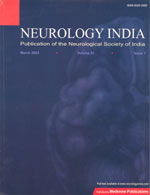
|
Neurology India
Medknow Publications on behalf of the Neurological Society of India
ISSN: 0028-3886
EISSN: 0028-3886
Vol. 57, No. 6, 2009, pp. 697-705
|
 Bioline Code: ni09203
Bioline Code: ni09203
Full paper language: English
Document type: View Point
Document available free of charge
|
|
|
Neurology India, Vol. 57, No. 6, 2009, pp. 697-705
| en |
Toxic neuropathies
Misra, Usha Kant & Kalita, Jayantee
Abstract
Toxic neuropathies generally result in length dependent axonal neuropathy with the exception of diphtheria and a few toxic neuropathies. In spite of occurrence of diphtheria in India there is paucity of published reports on diphtheritic neuropathy. Arsenic neuropathy commonly occurs in Bengal and Bangladesh because of ground water contamination whereas in Punjab it is due to contamination of opium. Lead neuropathy is rare and has been reported in battery workers and silver refining workers. It produces motor neuropathy resulting in foot drop and wrist drop. Organophosphates are used as pesticides, industrial chemicals and food adulterant. Certain organophosphates such as triorthocresyl phosphate used for or oil adulteration inhibit neurotoxic esterase and result in a delayed type of axonal neuropathy. Alcohol related neuropathy is a controversial issue whether it is due to alcohol related toxicity or due to nutritional deficiencies. Indian studies have revealed that neuropathy occurs both in alcoholic and nonalcoholic cirrhosis. Hexane neuropathy is reported in screen printers and these cases highlight the need for better preventive and occupational measures. Iatrogenic toxic neuropathies have been reported with cisplatin and vincristine. Because of geographical, occupational and health related conditions toxic neuropathies are likely to be more common than reported and greater awareness is needed.
Keywords
Arsenic, thallium, hexane, India, toxic neuropathy, organophosphate
|
| |
© Copyright 2009 Neurology India.
Alternative site location: http://www.neurologyindia.com
|
|
